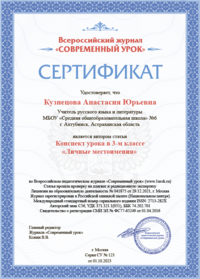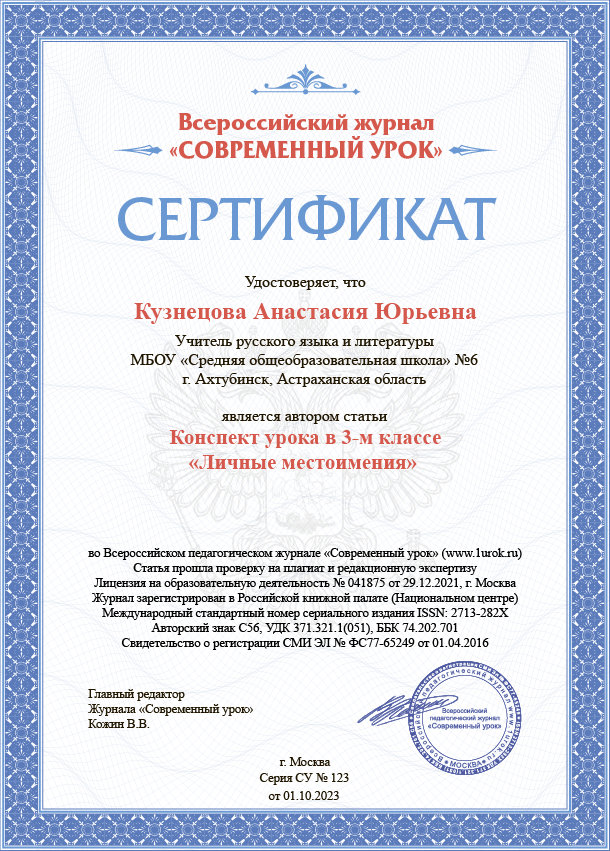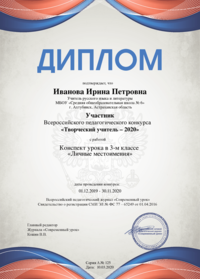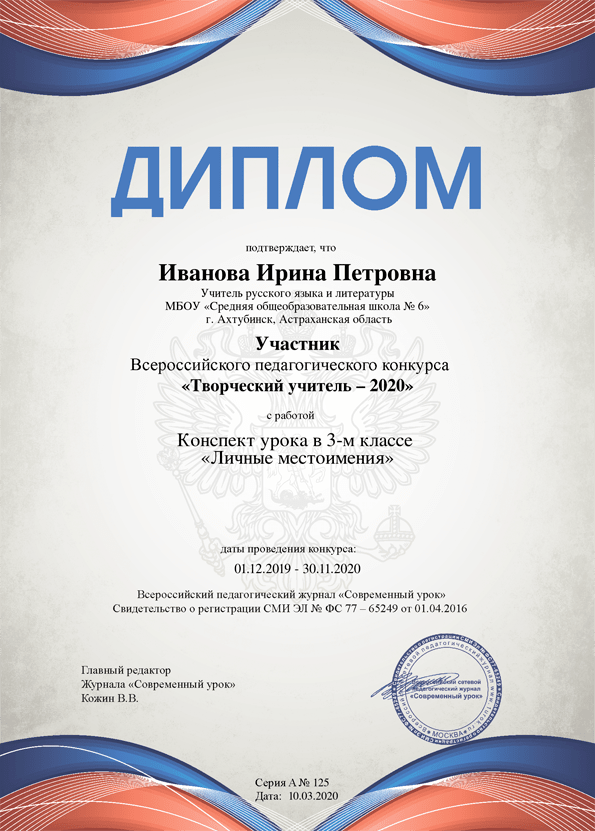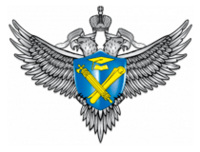Разработка урока английского языка для 10 класса «Travelling»
Автор: Уразовская Яна Викторовна
Организация: МАОУ «СОШ №3»
Населенный пункт: ЯНАО, г. Новый Уренгой
English lesson
“Travelling”
|
|
Yana Urazovskaya English teacher Secondary school #3 Yamalo-Nenets Autonomous Region, Novy Urengoy
Уразовская Яна Викторовна Учитель английского языка МАОУ СОШ №3 Ямало-Ненецкий автономный округ, г.Новый Уренгой
yanaurazovskaya18@gmail.com
|
Learners: the 10th form students
Annotation:
This methodological work is an English lesson in the 10th grade on the topic “Travelling” using the textbook “Rainbow English” by O.A. Afanasieva, I.V. Mikheeva English 10. The lesson reveals the application of such elements of pedagogical technologies as: collaborative learning, communication learning, technology foreign language culture, a personal-oriented approach. The purpose of this lesson is improving listening, reading, and speaking skills, development of communicative competence on the topic.
Objectives:
Teacher’s objectives:
- to present the vocabulary on the topic ‘Travelling’;
- to focus students on compound nouns and colloquial words;
- to practice students’ skills of speaking, listening, reading and writing;
- to develop students’ creative abilities, imagination, logical thinking;
- to improve their individual, pair work and group work skills;
- to broaden students’ cooperation, friendship, mutual assistance, ability to work hard.
By the end of the lesson students’ will be able:
- to compare different modes of travel;
- to analyze pros and cons of different forms of transport;
- to identify the reasons of travelling by reading the text;
- to create their own project concerning travelling by writing a plan of 4 points about their ideal holidays (with detailed description of each point).
Skills: speaking, listening, reading and writing.
Language content:
- vocabulary concerning the topic;
- grammar: compound nouns, acronyms, usage of Tense System.
- Material: a tape- recorder, CDs, pictures, cards with the tasks for listening, reading and speaking, a word-map, a Power Point presentation.
Procedure
- The beginning of the lesson.
Greeting.
- Warming up.
- How are you today?
- What is your favourite activity?
- What is the best way to relax for you?
- How can we find new friends, visit new places and learn new things?
- How do you understand the quotation? (Slide 1)
“Travel is the only thing you buy that makes you richer”
(Students’ answers)
- Presentation of new material.
The topic of our lesson is “Travelling”. (Slide 2)
By the end of the lesson you will be able: (Slide 3)
- to compare different modes of travel;
- to analyze pros and cons of different forms of transport;
- to identify the reasons of travelling;
- to create your own project concerning travelling.
Speaking. Answer the questions:
What ways of travelling do you know? (Look at the slide 4)
What is the fastest way of travelling?
What one is the most comfortable?
What is the most enjoyable way of travelling?
Ex. 1
What are the advantages and disadvantages of different forms of transport?
Useful adjectives: cheap/ expensive, comfortable/ uncomfortable, fast/slow, dangerous/ safe, reliable/ unreliable, relaxing/ stressful, convenient/ inconvenient, exciting/ tiring (Look at the slide 5)
- Different ways of travelling have different locations. What are they? (a bus station, an airport…) To learn more open your books at p.74 and find ex.2.
Ex. 2
Make compound nouns by matching words in column 1 with words in column 2.
Do you remember what ‘a compound noun’ is? (A noun made from two or more words).
(Slide 6)
- arrivals, baggage, buffet, check- in, departure, duty-free, hard, passport, petrol, taxi, ticket, waiting;
- reclaim, desk, hall, car, control, shoulder, gate, shop, office, station, room, rank.
Listen and check your answers, then repeat. (3.02 pronunciation) (Slide 7)
(arrivals hall, baggage reclaim, buffet car, check-in-desk, departure gate, duty-free shop, hard shoulder, passport control, petrol station, taxi rank, ticket office, waiting room)
Where is a stress? (A stress usually falls on the first word).
Answer the questions:
- Where do you go to collect your suitcases after you have landed? (baggage reclaim);
- Where do you go to buy some sandwiches? (buffet car);
- Where can you buy some perfume? (duty free shop);
- Where do you go to take a taxi? (taxi rank);
- Where do you stop when your car breaks down? (hard shoulder);
- Where do you stop to fill up the car? (Petrol station).
IV. Practice of new material.
Let’s play a game! (Snowball)
Repeat the first word after me and then add your own word from the list (Slide 6)
Ex.4 (Slides 7-10)
- Put the compound nouns into the correct group:
|
Air travel |
Road travel |
Rail travel |
|
arrivals hall, baggage reclaim, check-in-desk, departure gate, duty-free shop, passport control |
hard shoulder, petrol station, taxi rank |
buffet car, ticket office, waiting room |
Listening.
- Listen to eight dialogues and match them to eight locations. (Slide 11)
(Appendix 1)
1. a waiting room; 2. a buffet car; 3. the arrivals hall; 4. a duty-free shop; 5. a taxi rank; 6. a check-in-desk; 7. a departure gate; 8. a petrol station
Reading.
1. Answer the question
Why do people travel? (Students’ own answers)
- Read and match the people and their description. (Slide 12) (Work individually)
- a businessman; 2) a globetrotter; 3) a professor of History; 4) a coach potato.
- He likes to travel alone or with his students. They travel from curiosity. They like to see the beauty of the world and learn traditions of other countries. They think that travelling is fascinating and enjoyable. It broadens our mind and allows us to understand other people better. 3
- He doesn’t like to travel at all. He believes that it’s better to stay at home, because travelling is dangerous, troublesome and expensive. 4
- He likes to travel alone or with his friends. Usually he travels for pleasure or in search of adventures. When he travels, he likes to go sightseeing or explore unknown places. He believes that travelling is exciting and gives us life experience. 2
- Usually he travels alone on business. When he travels, he likes to meet new people. He thinks that travelling is useful but sometimes it’s a bit tiring. 1
- And what about you? Why do you travel? What is travelling for you? Do you prefer going away with friends or with your family?
- Respond to the statements that you have in your cards and say about yourself. Use ‘And you? What about you? What do you think about it?’ Do it one by one. (Slide 13)
|
I like to travel… |
alone, with friends, with parents, with a dog, with grandparents |
|
Usually I travel… |
on business, for pleasure, in search of adventures, from curiosity, to see the beauty of the world |
|
When I travel I like to... |
go shopping, meet new people, make new friends, go sightseeing, learn new things of other countries |
|
I think travelling is… |
exciting, useful, fascinating, enjoyable, good for health |
|
Sometimes it can be… |
disappointing, expensive, dangerous, troublesome, tiring |
|
And still travelling … |
Broadens our outlook, gives us life experience, leaves unforgettable impressions, helps us explore the world, allows us to understand other people better |
2. Running dictation. Work in 2 groups.
Here’s a DIY guide to planning a travelling with friends.
Your task is to read the article and fill in the missing words. This task is unusual and I need two groups and two volunteers to help you. The volunteers have to go to the end of this room, take only one part of the text but in logical order and read it to your group, then you can go to take the second part of the article. Students listen attentively to you and fill in the missing words. The first group who fills the article correctly will be the winner. Let’s start!
A ___
Here’s a DIY guide to planning a travelling with friends! So, you’re going away with friends, with nobody around to give you grief? Before you even leave home, be honest with each other about what you want from this holiday. Don’t wait until you arrive to discover you’re the only person who wants to spend lots of chilled nights in watching BBC World. Be honest about what you want before you leave and discuss any problems ASAP.
B ___
This might be the first time you’ve had lots of money to spend on yourself. But don’t forget that this money is supposed to last your whole holiday. Spending it all before you get as far as the airport departure gate isn’t a good idea. Be sensible: work out how much you’re going to spend each day and stick to it.
C ___
It’s worth staying switched on about your diet. You can certainly have a break from your everyday dishes, but just remember that your body needs vitamins and minerals, not just chips and burgers! It’s natural to want to relax on holiday, especially when you’re parent-free, but that doesn’t mean you should live like a pig. Personal hygiene still matters.
D ___
You’re on holiday from the stresses of the everyday world, but you’re also away your home and family. So try to look out for each other. And don’t be selfish. A mate who won’t make the effort should be left at home. Respect people’s space and their needs. Likes and dislikes.
E ___
You may feel differently when you’re hundreds of miles away, so be sure to keep in touch by phone, SMS or email. Don’t be afraid to pick up the phone or send a message home at any time if you’re feeling wobbly.
- What are the missing words? (give you grief, chilled, switched on, look out for, mate, wobbly)
- Match these colloquial words with the definitions below. (Slide 14)
Relaxing, friend, keep somebody safe (take care of somebody), not sure (worried), cause problems or worries, aware of (thinking about).
(1. Chilled, 2. Mate, 3. Look out for, 4. Wobbly, 5. Give your grief, 6. Switched on)
- Match the summary sentences (1-5) with paragraphs A-E. (Slide 15)
- You should think about your health. C
- You should contact home if you feel worried. E
- You should all agree on the type of holiday you want. A
- You should take care of each other while you’re away. D
- You should be careful with your money. B
V. Production
Writing. Work in groups of 4 (3 groups).
- Plan your ideal travelling. Make notes about:
- The people you want to travel with
- The places you want to visit and why
- Your accommodation and methods of transport
- The activities you plan to do
- Present your ideas to the class.
(Slide 16)
VI. Summarizing.
- What ways of travelling do you know?
- What are the pros and cons of them?
- What transport locations can you name?
- Do you prefer going away with friends or with your family?
(Slide 17) Remember!!!
“The world is a book and those who do not travel read only one page”
St. Augustine
VII. Home assignment.
- Write an essay “The world is a book and those who do not travel read only one page”.
Appendix 1
1.
Man Have you been waiting long?
Woman Yes, I have. I think my train must be late.
Man Hmm. Which train?
Woman The 12.05 to Manchester.
Man I think it’s gone.
Woman What do you mean? I didn’t see it.
Man It left from the other platform.
Woman Oh no!
2.
Man Can I have a cheese and tomato sandwich and a coffee, please? Oh, and an apple.
Woman White or brown?
Man I’m sorry?
Woman The sandwich. White or brown bread?
Man Brown, please.
Woman Black or white?
Man What?
Woman The coffee. Black or white?
Man White.
Woman There you are. That’s £12, please.
Man Oh, gosh, that’s a lot. I need more money. I’ll have to go back to my carriage.
3.
Man Judy! Over there!
Woman Chris! Thank you so much for coming to meet me!
Man Did you have a good flight?
Woman Yes, it was fine
Man The car’s in the car park. Here, I’ll help you with your bags.
Woman Thank you.
4.
Man I’d like this bottle of perfume.
Woman Of course. That’s £40 pounds, please. How will you be paying?
Man By credit card.
Woman Lovely. Can I see your boarding pass?
Man Yes, here it is. Hang on, I’m sure it was in this pocket. Oh dear…
5.
Man Here, let me put those bags in the boot.
Woman Thanks.
Man Where to?
Woman Baker Street, please. I’m in a bit of a hurry.
Man OK. Jump in. Don’t forget your seat belt. It’s the law now.
Woman Oh, OK.
6.
Woman Where are you flying to today?
Man Berlin
Woman And how many bags have you got?
Man Just this one. Can I take it as hand luggage?
Woman Yes, that looks OK.
Man Thanks.
7.
Man Great! We just made it in time!
Woman 1 Look, they’re boarding.
Man Come on.
Woman 2 Can I see your boarding pass?
Man Sure.
Woman 2 Only business class passengers are boarding at the moment. You’re in economy class.
Man Oh, OK.
8.
Woman Are you going to fit it up?
Man Yes. Why not?
Woman How much is the unleaded?
Man £1.40 a litre.
Woman That’s really expensive! Just put in enough to get us home!
Man OK.
Literature:
1. Афанасьева О.В., Михеева И.В., Баранова К.М. Английский язык “Rainbow English”, 10 класс/ Афанасьева О.В., Михеева И.В., Баранова К.М. - М.: Дрофа, 2015. – 253 с.
2. Falla Tim, Davies A Paul. Solutions Intermediate Student’s Book 2 nd edition/ Tim Falla, Paul A Davies. - Oxford University Press, 2017. - 136 p.

 БЕСПЛАТНЫЕ семинары
БЕСПЛАТНЫЕ семинары